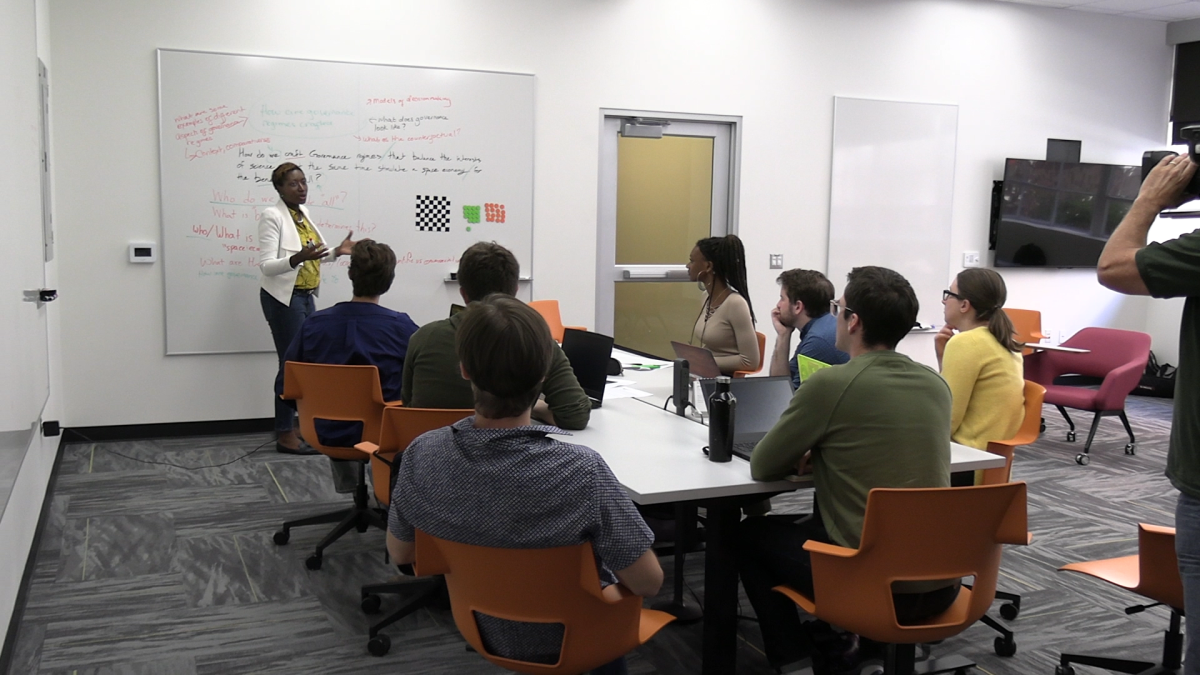Space Governance Innovation contest promotes a new space economy for students of African descent

Timiebi Aganaba, ASU lead on the 2020 Space Governance Innovation Contest, facilitating a class in ASU Interplanetary Initiative’s newly renovated Ideation Studio.

The Interplanetary Initiative’s Space Advisory project, in partnership with Space in Africa, the Lagos Court of Arbitration and the Outer Space Institute, is proud to announce and encourage students of African descent to participate in the 2020 Space Governance Innovation contest. This contest aims to challenge interdisciplinary teams of innovators to address policy gaps in international space law.
“At 15, my dad took me to the NASA Space Center in Houston,” said Timiebi Aganaba, project lead of the Space Advisory project and assistant professor in the School for the Future of Innovation in Society at Arizona State University. “I was a grumpy teenager and did not have any interest in planets or the stars. What does this have to do with me? I did not see space exploration as relevant to society, nor did I understand the benefits of invisible space applications.”
Ten years later, Aganaba found herself as one of the first hires in the legal affairs and international cooperation department of the Nigerian Space Agency during her mandated government National Youth Service, following law school graduation. She recalls, “It was a fascinating project. Looking at space issues from a developing country forces one to be really granular about the benefits of space. Why is space important and who should care about its development?”
This led Aganaba to ask questions about the future of governance in space. “How do we develop the most effective and best governance systems? How do we advise scientists and engineers to think beyond the technical when building out the future? And importantly, who do we bring to the table in determining the future and how participants are regulated?” Aganaba will be addressing these same problems in her class in the spring.
Answering these questions led to the launch of the Space Governance Innovation contest encouraging nonclassical and nontraditional actors to contribute fresh ideas and bring new perspectives to some of the old and new governance problems of space. Aganaba cites research from the Harvard Business school that showed 75% of solutions already exist and 70% of people who solved a hard problem were from a different technical/industry domain than the problem owner. “African students are certainly not the problem owners of space debris, space congestion and space as a warfighting domain, but they need to play a role in determining future governance regimes for human futures in space as well as the growing amount of space activities projected to come on line.”
As President John F. Kennedy said in his famous moon speech, “We do things not because they are easy, but because they are hard,” and with this contest, African youth and students have the ability to contribute to a domain that is not classically accessible to them.
The Space Governance Innovation contest is currently accepting applications for intent to apply from students of African descent from anywhere in the world. Interdisciplinary teams must consist of no more than four participants, where the inclusion of someone within legal studies is strongly encouraged. Prizes include cash, international virtual internships, publication opportunities and other rewards. Confirmed companies offering virtual and in-person internships include: OHB Hellas, Space & Satellite Professionals International (Silicon Valley), New York Space Alliance, Vieira de Amedia & Associates, Evisort, Metame and Open Lunar Foundation. Expressions of intent to register must be submitted by Dec. 13, 2019.
More Law, journalism and politics

Exhibit uses rare memorabilia to illustrate evolution of US presidential campaigns
After one of the most contentious elections in history, a new museum exhibit offers a historical perspective on the centuries-old…

TechTainment conference explores the crossroads of law, technology, entertainment
What protections do writers, actors, producers and others have from AI? Will changing laws around name, image and likeness (…

How to watch an election
Every election night, adrenaline pumps through newsrooms across the country as journalists take the pulse of democracy. We…